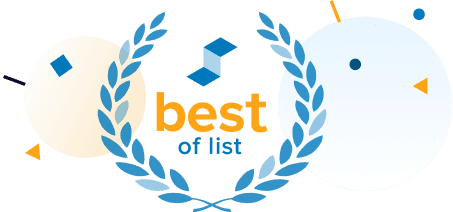Best Private Student Loans
April 2024
Paying for college expenses is not always easy. Tuition adds up. So does housing, not to mention books and supplies. Even if you’re living at home, you’re still going to have to eat and commute to school. To afford college, sometimes you need to look for the best private student loans options out there.

SuperMoney may receive compensation from some or all of the companies featured, and the order of results are influenced by advertising bids, with exception for mortgage and home lending related products. Learn more
Private student loans can cover the difference between what you need for school, aside from any federal student aid you receive, including loans, grants, work study pay, as well as personal funds. This list covers the best private student loan companies and what you should look for when you’re shopping for private student loans.
How much do you need?
Step one when planning for college is to figure out how much you need to pay for it. Use a college cost calculator to get started. Step two is to figure out how much you have - or can obtain. What are your available sources of money? Sources to consider include parents, savings, scholarships, grants, or a part-time job. Also, be sure to apply for need-based financial aid at the schools you're applying to as work-study jobs may be available. Consider all of your available options before turning to student loans.
Decide what type of loan to apply for
If you decide you need a student loan, be aware that there are two major sources of student loans:
- The U.S. government and
- Private loans, which come from lenders like banks and credit unions
The first step is to fill out the Free Application for Federal Student Aid (FAFSA). The primary reason you start by filling out the FAFSA is that the results let you know if you are eligible for federal student loans. All U.S. citizens who are students can qualify for unsubsidized federal student loans, regardless of financial need. And U.S. government loans have several advantages over private student loans.
Federal student loans generally have a lower interest rate, for example. And you don't have to repay federal student loans until your education is completed. With private student loans, you may have to repay as you study. In addition, federal student loan borrowers may be eligible for loan forgiveness if they work in certain occupations. And repayment of federal student loans can be based on income.
Private student loans are issued through banks and credit unions - the same places that offer loans for mortgages and cars. They generally expect payment on their student loans from the beginning, much as they would for a car loan.
The FAFSA Application
Following is the information you will need to complete the Free Application for Federal Student Aid:
- Your Social Security Number
- Your most recent federal income tax return, W-2s, and other records of income
- Bank statements and records of investments (if applicable)
- An FSA ID (to sign electronically)
Also, do you live with your parents? Do they financially support you or your education? If so, they may have to fill out a part of the FAFSA application. Processing the FAFSA takes several weeks. When you receive the results (typically by e-mail), you'll know if you are eligible.
Private student loans
If you still need additional money after taking out a federal student loan, private loans are another option to consider. It's a good idea to find out your credit score before applying for a private student loan. If your credit score is good to excellent, you might be able to get a loan with a lower interest rate than someone with average or bad credit. The low end of interest rates for private student loans is around 2.5%. Interest rates can be as high as 12%. If your credit is average, your parents financially support you, or your income is not high enough to qualify for a private student loan, you may need a cosigner. On the plus side, if your cosigner has excellent credit, more favorable interest rates may be available. Lenders will consider the creditworthiness of both you and your cosigner. Good credit will result in a more favorable interest rate because the risk the lender is taking on is decreased. To receive a private student loan, you'll need to apply to each lender you choose, as private lenders do not have a one-size-fits-all application like the FAFSA. You will need to supply credit information, salary, and work history. Private student loan lenders will look at your income, your ability to repay, and how much debt you have (which lenders call your debt-to-income ratio). They will loan you money only if you meet their requirements.
Compare the terms
It's a good idea to look at several different lenders when considering a private student loan. Interest rates vary, for one thing, and you want the lowest interest rate possible. The type of interest rate offered is also a factor. There are two types: fixed and variable. Fixed means that the interest rate will always stay the same. If you lock in at 14%, your payments will always have that interest rate.
Fixed Rate Student Loans: A fixed interest rate doesn’t change throughout your repayment term. It stays steady, despite market fluctuations.
Benefits:
- Predictable monthly payments
- Pre-defined total interest amount
Variable Rate Student Loans: Variable interest rates change throughout the course of your loan term because they rely on shifting tides in the world economic market.
Benefits
- Lower interest rates
- Immediate, short or long term savings
But a variable interest rate will move up and down as interest rates rise or fall, and your monthly payments will rise and fall accordingly. Rates increase and decrease according to the economy. During times of economic growth, interest rates rise. Finally, banks and other lenders vary in term of repayment plans. It may be possible to find a private lender who offers deferments while you are still in school, or forbearance while you are looking for a job after college. And if you or a parent belong to a credit union, their terms are often more favorable than those of banks.
FAQ on Private Student Loans
How long do private student loans take to process?
It can take anywhere from 2 – 10 weeks for you or your college to receive the funds from the date that your loan application is approved.
What is a private student loan?
A private student loan is a credit-based loan for college that can cover the gap between financial aid received and the full cost of attendance. Private student loans are issued by private lending institutions, such as banks and credit unions. Lenders will require you to submit an application. Upon receipt of your application, they will confirm you meet their credit approval criteria, and ask you complete any other requirements (such as verification of school registration).
Do private student loans build credit?
It depends. If you make all of your payments on time, your credit may improve over time. Late and missed payments may damage your credit. If you need to obtain a loan later (additional private student loan, car loan, or mortgage), your debt-to-income ratio will likely be considered. It is always recommended to borrow only what you need.
How much can you get in private student loans?
Private student loan lenders, generally, will not let you borrow money in excess of your cost of attendance. Your school will let you know the maximum amount you can borrow in a private student loan, which will be determined by subtracting all the aid you have been awarded/accepted from your total cost of attendance.
Can I get a private student loan without a cosigner?
90% of undergraduate students and 75% of graduate students need a cosigner to get approved for a private student loan. Some students may have the credit qualifications to get approved without a cosigner. It all depends on your credit rating and history. Different lenders have different qualifying criteria. To determine eligibility, it’s best to contact a potential lender directly.
About the Author

SuperMoney
SuperMoney is the most comprehensive financial services comparison site around. We have published hundreds of personal finance articles and provide detailed reviews on thousands of financial products and services. Our unbiased advice and free comparison tools help consumers make smart financial decisions based on hard data, not marketing gimmicks.